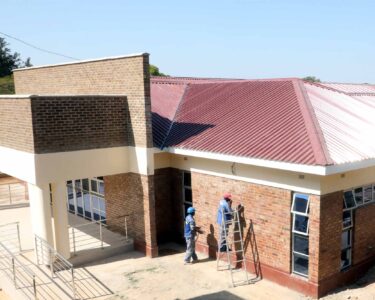Being an agricultural extension officer is generally considered an arduous job that requires loads of patience and hard work. Some human resources practitioners actually think this is a strictly man’s job. However, as our Editor-in-Chief Munyaradzi Huni recently discovered, there are some women who are determined to break the glass ceiling in their bid to prove that women can do any job under the sun.
Omega Ndou, the agricultural extension officer for Ward 14, Beitbridge District, is one such woman. She has a petite body and speaks softly like your typical receptionist or private secretary to a CEO, but don’t let her demeanour fool you.
Behind that soft-as-wool façade is a woman of steel who believes in hard work and makes the agricultural extension officer’s work look like a stroll in the park.
“I know some people are surprised by my strong passion for farming, but this is where my heart is. I enjoy working with animals and I would not leave this profession for any other job,” says Ndou, a wide smile creasing her face.
She adds: “When I was first appointed as an agricultural extension officer in Insiza some years ago, most farmers looked down on me. There were whisperings like: ‘What can she teach us? She is too young.’ To make things worse, I have a small body and so most farmers did not take me seriously.
“However, I am very patient with people. I kept on interacting with the farmers while imparting my farming knowledge during field days. Within a few months, most of them had warmed up to me and began to seek my services. We work so well together such that when I was transferred to Umzingwane, they continued to call me for advice.”
She is quick to add, though: “I am still facing challenges working with the community here in Beitbridge District, maybe because I am still new here. Farmers are not cooperating well with me. However, I love this job and I am determined to make sure that they appreciate my role. I know, with time, I will win most of them over. My roots are here. I was born and bred in Zezani, Ward 11, Beitbridge District.
“Despite my transfer, I am still very close to some of the farmers in Insiza. I really like this because I believe in making an impact in people’s lives. However, there is one thing that worries me a lot.
“Farming requires a lot of hard work and it needs energetic people, but youths don’t really like venturing into farming. Most youths don’t come for training. They leave farming to their parents who no longer have the necessary energy. This is one of the biggest challenges I have faced everywhere I have worked. I think this is a national problem. Some youths believe farming is not for them, yet there is money in farming.
“I don’t know what the government can do to entice youths to embrace farming. All our unemployment problems can be sorted out overnight if youths venture into farming. We have the land and the government has put in place concrete measures to support new farmers. Youths should take advantage of this opportunity to venture into farming and shun alcohol and drug abuse.
“Whenever I am transferred to a new area, one of the first things I do is study people’s habits, customs and behaviour. And the one thing I have discovered in all the areas I have worked is that it is the adults who are into farming. With the youths, it’s a different ball game altogether. I remain hopeful that the youths in Matabeleland South will change their ways and take farming seriously. Believe me, there is lots of money in the land,” says Ndou.
The Second Republic has embarked on a drive to recruit agricultural extension officers across the country as it seeks to boost extension service delivery and help in the implementation of the Agriculture and Food Systems Transformation Strategy. The Ministry of Lands, Agriculture, Water, Fisheries and Rural Resettlement is spearheading the dive. At the end of 2020, the government recruited hundreds of extension officers to fill vacancies in Matabeleland North and Matabeleland South.
A graduate of Esigodini Agricultural College, where she studied for a certificate and diploma in agricultural extension between 2009 and 2010, Ndou says: “I chose to be an agricultural extension officer because farming is my passion. I also grew up in a farming family. My parents are into both crop and livestock farming. Farming is all I know and farming is all that I love.
“As part of my job description, I train and advise farmers, conduct demos for farmers as well as undertake crop and livestock assessments. The overall objective is to equip farmers with all the requisite knowledge to boost both agricultural and livestock production and thereby food security. For example, when it comes to livestock, we encourage farmers to venture into fodder production since Beitbridge is dry area.
“In this respect, we encourage farmers to grow grasses such as Banner and Katambora or grass cereals like maize and sweet sorghum which are rich in carbohydrates. For the purposes of making hay or silage, farmers can also use legumes like cowpeas. The use of such diversified fodder crops is important because it ensures livestock get balanced nutrients,” says Ndou.
Ndou does not hide her love for animals, especially donkeys: “Farmers here use animals like donkeys to till their land, pull scotch-carts and so on, but they don’t want to give them the love and care they deserve.
“The biggest victim is the donkey. It does a lot of work, but I have seen that some farmers don’t even want to give their donkeys a rest. From morning till evening they want the donkeys to be working non-stop. People in Matabeleland South abuse donkeys. It breaks my heart.”
Will the people of Matabeleland South please show some love for the hard-working donkey!





